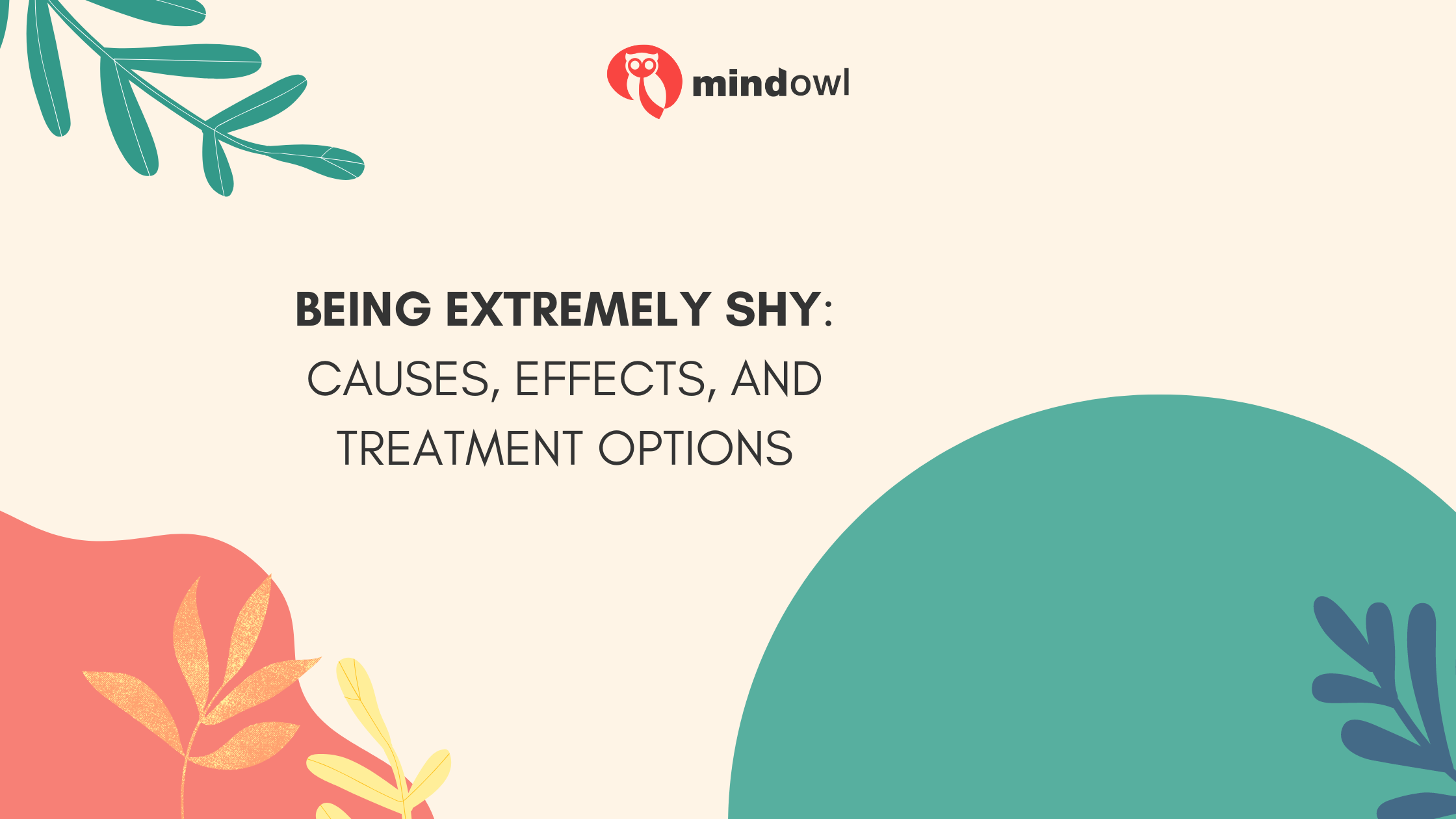Shyness is a common trait that many of us navigate through at various points in our lives, but when does it cross the line from a mild, manageable characteristic to a profound challenge that impacts every facet of life? Extreme shyness can be more than just an occasional inconvenience; it can influence one’s ability to form relationships, succeed in school or the workplace, and enjoy a fulfilling life.
As we peel back the layers of extreme shyness, we’ll also explore the transformative journey from the shadows of shyness to the light of self-confidence and social ease. Whether you’re navigating this challenge yourself or supporting someone who is, join us as we explore the path to overcoming extreme shyness, embracing vulnerability, and unlocking the door to a more connected and confident life.
Key Takeaways
- Extreme shyness affects many adults and children, leading to nervousness and awkwardness in social situations.
- Shyness can lead to mental health issues like social anxiety disorder, impacting careers and relationships.
- Different types of shyness include shy-secure, shy-withdrawn, shy-dependent, and more.
- Severe shyness can be managed effectively through CBT therapy, exposure therapy, social skills training, or medication.

What is Shyness?
Definition of shyness
Shyness is a feeling of unease or hesitation around others, especially in new situations. Shy people may fear meeting someone new or making small talk at parties. They often worry about how they appear to others and might be self-conscious.
This can make them avoid social situations where they have to talk or be the centre of attention.
Some folks feel shy since childhood, while others develop shyness later due to life experiences. A shy person might take longer to warm up to new people and situations. Being timid doesn’t always mean avoiding people altogether; it’s more about feeling nervous when you’re not sure what to say or do around others.
Shyness in adults
Many adult lives are touched by shyness, impacting their social interactions and self-esteem. They often feel nervous or uneasy around new people or in social situations. This can make it hard for them to meet new friends, connect with others, or even speak up at work.
Some shy adults might avoid group activities or public speaking because they fear judgment or rejection.
Adults who struggle with extreme shyness may face mental health issues like social anxiety disorder. Their careers and personal relationships can suffer as a result. They might turn down promotions to avoid being in the spotlight.
Or they could stay in unhealthy relationships because they’re scared of being alone. Overcoming shyness is key for these adults to become more confident and enjoy a richer social life.
Shyness in children
Some children find it hard to talk to others or join in games. They may hide behind a parent or keep quiet in class. This shy style can make school and making friends tough for them.
They often watch from the side instead of playing with other kids.
A shy child might take longer to feel comfortable around new people. Being less shy takes time, so they need support and patience. Parents can help by setting up playdates and encouraging their kids to try new things slowly.
This helps build social skills and confidence over time, leading to understanding the different types of shyness next.
The different types of shyness
Shy-secure
Some people feel shy but still manage to be okay with it. They know they’re not the first to walk into a room or start a conversation, and that’s fine with them. These folks are “shy-secure“.
They don’t let their shyness stop them from having friends or doing what they like. Even though they might not talk much in front of people, they feel good about themselves inside.
Shy-secure individuals can make small talk when needed, even if meeting new people isn’t their favourite thing to do. They often have a group of friends and enjoy fun times with them.
Shy-withdrawn
People who are shy-withdrawn often doubt themselves. They may worry about doing something wrong all the time. This fear can stop them from speaking up or taking action. Because they pull back and don’t share much, they might feel very lonely.
Others don’t get to know the real them because they’re holding back so much.
Shy-withdrawn individuals struggle with putting themselves out there. Lack of assertiveness is a big challenge for them. Without it, making friends becomes tough and socialising seems scary.
Shy-dependent
Those who are shy-dependent usually cling to family or close friends in social settings. They might struggle to talk to new people without someone they trust by their side. This type of shyness can stop them from developing good social skills.
It might make it hard for them to become less shy as they rely on others so much.
This dependency means that making new friends or speaking up at school could be tough for them. Kids with this kind of shyness may need extra support and encouragement to face social challenges on their own.
Shy-conflicted
Shy-conflicted individuals often find themselves in a tug-of-war with their social desires. They want to join in and make new friends but feel held back by intense anxiety. Their minds tell them to go for it, but fear whispers to stay put.
This inner conflict makes overcoming shyness tougher, as they swing between wanting to socialise and preferring avoidance.
These people might get ready for a fun event only to bail out at the last minute due to fear of judgment or rejection. They may watch others having good times and long to be part of the group.
Yet, when an opportunity comes, they freeze or run away from the chance to connect. For shy-conflicted persons, each step towards being socially confident is met with an equal push of doubt that holds them back.
Fearful shyness
Fearful shyness is characterised by an intense fear of social situations and interactions. Those experiencing fearful shyness may avoid social gatherings or speaking up in class or work meetings due to overwhelming anxiety and worry about embarrassing themselves.
This extreme form of shyness can lead to physical symptoms like sweating, rapid heartbeat, and panic attacks when faced with social situations, significantly impacting daily life activities, relationships, and self-esteem.
Additionally, individuals with fearful shyness may struggle more significantly with behavioural inhibition, somatic anxiety, and poor social skills compared to other types of shyness.
Self-conscious shyness
Moving on from the intense fear found in “Fearful shyness,” we come to “Self-conscious shyness.” This type of shyness is marked by a strong awareness and concern about how one is perceived by others.
People experiencing self-conscious shyness tend to be overly preoccupied with potential criticism or embarrassment, often leading to avoidance of social situations.
Individuals with self-conscious shyness may exhibit physical sensations like blushing, sweating, or trembling when faced with social interactions. They might also struggle with maintaining eye contact, speaking softly, or displaying nervous behaviours in group settings.

When Shyness Becomes a Problem
Shyness-related substance abuse
Research has shown that shyness can have a complex relationship with substance use, acting as both a protective factor and a potential risk factor depending on the context and individual differences. For example, a study found that shy individuals, particularly males, were more likely to use substances such as marijuana, hashish, cocaine, amphetamines, and hallucinogens compared to their non-shy counterparts. This suggests that for some, shyness may lead to substance use as a coping mechanism to alleviate the discomfort associated with social interactions.
Conversely, super-shy females were less likely to consume alcohol than their less shy or not-shy peers, indicating that the impact of shyness on substance use can vary significantly by gender and type of substance.
While shyness may protect against substance use in some cases, it can also increase vulnerability to substance abuse in others, particularly when individuals turn to drugs or alcohol to self-medicate feelings of social discomfort or anxiety.
Unhealthy relationships
Shyness can lead to unhealthy relationships, as it may cause difficulty in forming and maintaining connections with others. Shy individuals often struggle to express their feelings or needs, leading to miscommunication and misunderstandings in relationships.
This can result in feelings of isolation and loneliness for individuals dealing with extreme shyness, impacting their mental well-being and overall quality of life. Additionally, the fear of rejection or negative judgment can prevent them from seeking out new relationships or deepening existing ones, further exacerbating the cycle of social disconnection.
Difficulty achieving goals
Struggling with extreme shyness can make it challenging to pursue and achieve personal and professional goals, leading to missed opportunities. Shy individuals may find it difficult to speak up in meetings, network effectively, or take on leadership roles due to fear of judgment or embarrassment.
This can hinder their career advancement and limit their personal growth, creating feelings of frustration and low self-esteem.
Internet addiction
Internet addiction can impact people who are shy by providing an escape from social situations that make them uncomfortable. Spending excessive time online may hinder opportunities for in-person interactions, leading to further isolation.
This could exacerbate feelings of shyness and contribute to deeper social anxiety. It’s important for individuals struggling with extreme shyness to seek a balance between online activities and real-world connections, which can help in building confidence and improving social skills.
Shyness, anxiety, and depression
Shyness can lead to anxiety and depression. It’s vital to address these issues early on. Seeking help from a therapist or counsellor can provide effective strategies for managing shyness-related mental health concerns, such as anxiety and depression.
Understanding the interplay between shyness, anxiety, and depression is crucial in finding holistic treatment approaches that cater to individual needs. By addressing these challenges proactively, individuals can significantly improve their mental well-being and quality of life.

Contributing Factors to Extreme Shyness
Parenting styles
Different parenting styles can significantly influence a child’s development of shyness. Authoritarian and overprotective parenting styles may contribute to the development of extreme shyness, while supportive parenting can foster confidence and social skills.
Encouraging independence and providing emotional support are vital in nurturing self-assuredness in children, reducing the likelihood of extreme shyness.
Negative childhood or adolescent experiences
Bullying or abuse experienced in early life can contribute to extreme shyness in adulthood. These experiences may lead to feelings of inadequacy and fear of rejection, impacting a person’s ability to interact confidently with others.
Negative encounters during formative years can also shape an individual’s self-perception and social skills, often leading to long-lasting effects on their mental well-being and relationships.
Traumatic life events
Traumatic life events, such as abuse or the loss of a loved one, can significantly contribute to extreme shyness. Children who experience trauma may develop fearful shyness, impacting their ability to form healthy relationships and interact with others.
These events can deeply affect self-esteem and confidence, leading to long-term social anxiety.
Treating Extreme Shyness and Social Phobia
Seeking help for severe shyness
- Look for therapists or counsellors with experience in treating extreme shyness or social phobia.
- Seek recommendations from trusted sources such as mental health professionals, friends, or support groups.
- Schedule an initial consultation to discuss your symptoms and treatment options.
- Be open and honest about your experiences with shyness and any related concerns during therapy sessions.
- Collaborate with your therapist to develop a personalised treatment plan tailored to your specific needs and goals.
- Engage in regular therapy sessions to address underlying issues contributing to extreme shyness and develop coping strategies.
- Consider joining support groups or online communities for individuals dealing with severe shyness to connect with others facing similar challenges.
- Explore additional resources such as self-help books, podcasts, or workshops focused on overcoming extreme shyness.
CBT therapy
CBT therapy aims to help individuals identify and change negative thought patterns and behaviours that contribute to extreme shyness and social phobia.
Through the help of a therapist, individuals can learn practical strategies to challenge their fears, build confidence, and improve social skills. This evidence-based approach is particularly beneficial in addressing the underlying causes of extreme shyness and empowering individuals to overcome it.
CBT therapy equips people with the tools they need to manage anxiety and develop healthier ways of thinking and interacting with others, ultimately leading to improved mental health.
Exposure therapy
Exposure therapy involves facing feared situations or objects gradually to reduce anxiety. It helps individuals confront their fears in a safe and controlled environment, teaching them healthier ways to cope with their fears.
This type of therapy can be effective in addressing social anxiety and shyness, allowing individuals to build confidence and improve social interactions over time. Professional guidance is crucial when undergoing exposure therapy to ensure it’s tailored to individual needs and progress is monitored effectively, supporting a gradual reduction in shyness-related anxieties.
Social skills training
Social skills training involves learning and practising effective ways to interact with others. It focuses on developing conversation, listening, and assertiveness skills to build confidence in social situations.
Incorporating activities that simulate real-life social interactions can help individuals gradually become more comfortable and adept at communicating with different people in various settings.
Role-playing or group exercises help individuals overcome their shyness by providing opportunities to engage in real-time interactions.
Medication
Medication is an option for treating extreme shyness and social phobia. It can help alleviate symptoms such as anxiety and fear, making it easier to feel comfortable around others.
Some prescribed medications aim to reduce feelings of panic or fear in social situations and are generally used alongside therapy techniques like cognitive-behavioural therapy (CBT) to achieve the best results.
In addition, medication should always be used under the guidance of a healthcare professional who will carefully monitor its effects on your mental health condition. It’s important to speak to someone you trust about any concerns you may have regarding medication options for managing extreme shyness or social phobia, ensuring that you explore all available treatment options before deciding on what suits your circumstances best.
Seeking help when needed is crucial; remember that there are various effective methods to address extreme shyness beyond just medication.
Conclusion
Extreme shyness can have significant impacts on individuals’ social and emotional well-being. Understanding the causes, effects, and treatment options for extreme shyness is crucial for assisting those who struggle with it.
Seeking help from professionals, such as through CBT therapy or social skills training, can provide effective ways to manage and overcome extreme shyness. By recognising the signs of severe shyness and taking proactive steps towards addressing it, individuals can work towards leading more fulfilling lives.
Identifying these strategies empowers individuals to break free from the limitations that extreme shyness may pose.
FAQs
1. Why are some people very shy?
Some people may be shy because of their personality, such as being an introvert, or they might feel socially awkward. Shy feelings can also come from not having enough chances to practise social behaviours.
2. Can being extremely shy affect your health?
Yes, if you’re very shy and don’t interact much with others, it could lead to serious mental health issues like depression and anxiety. Your overall health and well-being need to find ways to manage shyness.
3. How do psychology today experts say you can overcome shyness?
Experts suggest practising social skills, connecting with a therapist if needed, and slowly putting yourself in new situations where you can get used to interacting with people.
4. What is the difference between being shy and an introvert?
Being shy often means feeling nervous when meeting new people or speaking up in groups while an introvert simply prefers quieter environments or fewer social interactions but isn’t necessarily scared of them.
5. Do all children grow out of being shy?
Not always; while some children become less shy as they grow older, academic research institutions found that about 15 per cent of children stay quite reserved throughout their lives.
6. Are there any fun ways for someone who’s extremely shy to start socialising more?
You bet! Starting with small steps like sharing your interests in a club or group can make practising socialising easier without too much pressure – just avoid taking on too much at once!
MindOwl Founder – My own struggles in life have led me to this path of understanding the human condition. I graduated with a bachelor’s degree in philosophy before completing a master’s degree in psychology at Regent’s University London. I then completed a postgraduate diploma in philosophical counselling before being trained in ACT (Acceptance and commitment therapy).
I’ve spent the last eight years studying the encounter of meditative practices with modern psychology.

